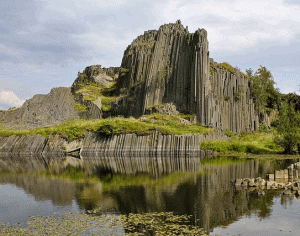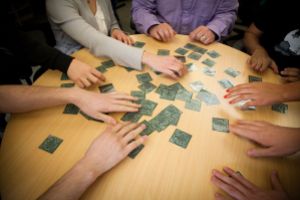
Wikipedians around the world are looking for ways to convert readers into new editors and encourage new people to join our common effort to produce a freely accessible encyclopedia for everybody to use. Wikimedia Chapters and the Wikimedia Foundation continually search for ways to increase the base of active editors, which is now consistently around 80,000-90,000.
As part of our programs, Wikimedia Czech Republic has recently created a memory game showcasing free images from Wikimedia Commons as a simple and enjoyable way to reach out to families, educational institutions and photographers. After all, we asked ourselves, is there a better way to make people excited to join than seeing the happy faces of both children and their parents?
Many Wikipedians who have similar hobbies or fields of interest have organized around their area of focus, which gave birth to WikiProjects. The Czech Wikipedia’s WikiProject Protected Areas tries to coordinate editors who are interested in protected areas, nature habitats, traveling and photography.
For the creation of the WikiProject Protected Areas game, we chose colorful and wonderful images, which were taken by dozens of authors and are freely available on Wikimedia Commons. We sorted them and included information about our WikiProject. That gave us an opportunity to tell the story to recipients and made a small advertisement, which hopefully will attract their interest to Wikipedia, too. Our idea was that adults will read the story while cutting out the game pieces for their children. At a minimum, we can share knowledge in an entertaining way!
After uploading the WikiProject Protected Areas memory game [available as a pdf] on Commons, we printed 1000 editions of it with support from Wikimedia Czech Republic. We distributed the game for free to interested parties, including schools and other institutions. We also delivered copies to administration of Czech Krkonoše National Park (KRNAP), to the Czech Union for Nature Conservation, to several elementary and high schools and to the wide range of Wikimedia Czech Republic’s fans on Facebook.
In addition to printing the memory game, we have coordinated activities with Charles University, where students contributed articles for about 30 protected areas in the Czech Republic. Through our Facebook and Google+ pages, we’ve worked with photographers to photograph 40 protected area localities and upload their images to Commons. We are coordinating a photo walkabout with wiki-photographers to improve our photo skills and capture images of protected areas in the process. And finally, we have even made the national news, where we highlighted the coordination with Charles University and brought more attention to the project.
We are happy to say that, through this game, we have connected with groups of people who support the conservation of nature and who like to travel a lot. They represent potentially good editors for our WikiProject about protected areas because they have both a wide range of knowledge and photos from their trips. We deeply believe this small gift together with our other activities can bring new editors to Wikipedia projects. And, in the process we brought a lot of smiles to children’s faces and we strengthened the good name of Wikipedia in lots of families and public circles.
Thank you,
Petr Brož
Wikimedia Czech Republic


Can you help us translate this article?
In order for this article to reach as many people as possible we would like your help. Can you translate this article to get the message out?
Start translation